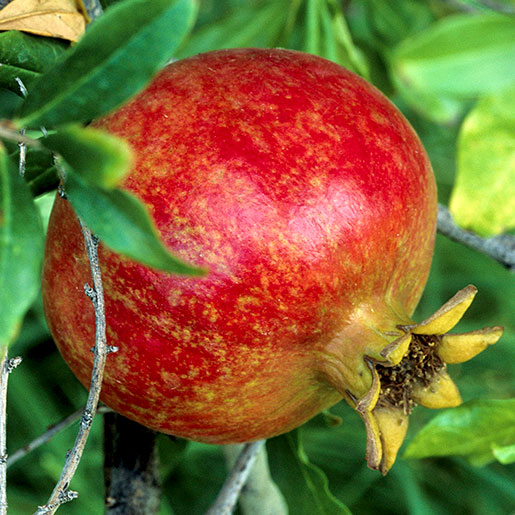Pomegranate

Common Names: Pomegranate
Latin Names: Punica granatum
Background
- Pomegranate is a small, fruit-bearing tree that comes from the Middle East and is now cultivated in many parts of the world, including the Mediterranean region, Southeast Asia, and the Southwestern United States.
- Pomegranate was used in traditional medicine to treat intestinal parasitic infections, diarrhea, sore throat, and other conditions. It has been used orally (by mouth), topically (applied to the skin), and as a gargle or mouthwash.
- Preparations from pomegranate are currently promoted for many conditions including high blood pressure, heart disease, and diabetes.
How Much Do We Know?
- There’s some evidence from studies in people on the effects of pomegranate for a few health conditions. Many of the studies have used pomegranate juice rather than dietary supplements.
What Have We Learned?
- Pomegranate juice or extract may be helpful in reducing blood pressure, but additional research is needed to confirm this effect.
- Studies show that pomegranate may reduce blood glucose levels to a small extent.
- Studies have been done to see whether various products from pomegranate can influence levels of cholesterol and other lipids, but no clear effects have been demonstrated.
- The limited research that’s been completed so far doesn’t allow conclusions to be reached about whether pomegranate is helpful for any other health conditions.
What Do We Know About Safety?
- Pomegranate juice is believed to be safe. Pomegranate extract may also be safe. Pomegranate root, stem, and peel may not be safe when consumed in large amounts because they contain substances that can have harmful effects.
- Pomegranate usually doesn’t have side effects, but some people may have digestive tract symptoms. Allergic reactions to pomegranate have been reported.
- Drinking pomegranate juice during pregnancy or while breastfeeding may be safe. Little is known about whether it’s safe to use other forms of pomegranate or other parts of the plant during pregnancy or while breastfeeding.
Keep in Mind
- Take charge of your health—talk with your health care providers about any complementary health approaches you use. Together, you can make shared, well-informed decisions.
- If you take any type of medicine, talk with your health care provider before using any herbal product; some herbs and medicines interact in harmful ways.
- Federal Regulation of Herbal Products
- Depending on what’s in them, how they’re intended to be used, and how they’re administered (orally or topically), herbal products are regulated in a variety of ways. Many herbal products intended for oral use are marketed as dietary supplements. The regulatory paths for making and distributing dietary supplements are different than those for drugs.
- Unlike drugs, dietary supplements are not approved by the U.S. Food and Drug Administration (FDA) before they are sold to the public. When public health concerns arise about the safety of a dietary supplement or an ingredient including an herb, the FDA can take action to protect the public. Manufacturers and distributors of supplements are responsible for evaluating the safety and labeling of their products before marketing to ensure that they meet all regulatory requirements.
NCCIH Clearinghouse
The NCCIH Clearinghouse provides information on NCCIH and complementary and integrative health approaches, including publications and searches of Federal databases of scientific and medical literature. The Clearinghouse does not provide medical advice, treatment recommendations, or referrals to practitioners.
Toll-free in the U.S.: 1-888-644-6226
Telecommunications relay service (TRS): 7-1-1
Website: https://www.nccih.nih.gov
Email: info@nccih.nih.gov (link sends email)
PubMed®
A service of the National Library of Medicine, PubMed® contains publication information and (in most cases) brief summaries of articles from scientific and medical journals. For guidance from NCCIH on using PubMed, see How To Find Information About Complementary Health Practices on PubMed.
Website: https://pubmed.ncbi.nlm.nih.gov/
Office of Dietary Supplements (ODS), National Institutes of Health (NIH)
ODS seeks to strengthen knowledge and understanding of dietary supplements by evaluating scientific information, supporting research, sharing research results, and educating the public. Its resources include publications (such as Dietary Supplements: What You Need To Know) and fact sheets on a variety of specific supplement ingredients and products (such as vitamin D and multivitamin/mineral supplements).
Website: https://ods.od.nih.gov
Email: ods@nih.gov (link sends email)
Key References
- Aziz Z, Huin WK, Hisham MDB, et al. Effects of pomegranate on lipid profiles: a systematic review of randomised controlled trials. Complementary Therapies in Medicine. 2020;48:102236.
- Bahari H, Ashtary-Larky D, Goudarzi K, et al. The effects of pomegranate consumption on glycemic indices in adults: a systematic review and meta-analysis. Diabetes & Metabolic Syndrome. 2024;18(1):102940.
- Bahari H, Omidian K, Goudarzi K, et al. The effects of pomegranate consumption on blood pressure in adults: a systematic review and meta-analysis. Phytotherapy Research. 2024;38(5):2234-2248.
- Pomegranate. NatMed Pro website. Accessed at naturalmedicines.therapeuticresearch.com on August 5, 2024. [Database subscription].
- Zare H, Ardekani EA, Tavakoli A, et al. Reporting of adverse effects of pomegranate in clinical studies: a systematic review. Journal of Complementary and Integrative Medicine. 2023;21(2):154-166.
This publication is not copyrighted and is in the public domain. Duplication is encouraged.
NCCIH has provided this material for your information. It is not intended to substitute for the medical expertise and advice of your health care provider(s). We encourage you to discuss any decisions about treatment or care with your health care provider. The mention of any product, service, or therapy is not an endorsement by NCCIH.